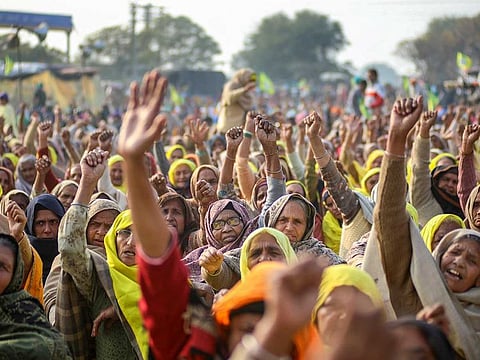Farmer protests: Let’s make India great again
India’s democratic credentials are the country’s biggest asset in the world

“My reputation is not decided by a newspaper in New York”. India’s Foreign Minister Dr S Jaishankar famously declared this in the winter of 2019, at a time when the Western media and some governments were critical of the Indian government over the NRC-CAA (Citizenship Amendment Act) and mass arrests in Jammu and Kashmir after the state’s special status was revoked in August of that year.
Last week, as New Delhi had a meltdown over tweets by pop mega star Rihanna on the farmer protests, the foreign minister tweeted “we have the self confidence to hold our own” in the face of “motivated campaigns”.
The Ministry of External Affairs, which normally never comments on remarks made by private individuals, took the unprecedented step of not just making a statement but also creating a Twitter hashtag “IndiaAgainstPropaganda”.
The MEA’s first line of defence, that the farm laws were passed by parliament does not stand. Passing laws with a voice vote, not allowing a division of votes, undermined the whole process.
Indian actors and sportspersons were then told to tweet nearly identical statements to push back against the “misinformation” campaign being waged by the “foreign hand”. Icons and stars who never speak on any pressing issue facing the country, were suddenly tweeting in tandem, word for word, about farmers, India’s unity and so on.
Cricketing heroes said India’s sovereignty could not be compromised (you would be forgiven for thinking that Rihanna was a bigger threat than China). That’s not to say that these celebrities should not express an opinion on the farmer protests. But at least be original with your tweets. They ended up doing a shoddy copy paste job and “propaganda” took on a whole new meaning.
Far from looking confident, India has come off as insecure and thin skinned. It’s is simply cringeworthy that a country as big as India should react this way to criticism. Did a few tweets really hurt the country’s unity and integrity? Are we so weak? Actually we aren’t but helps to have an invisible enemy to target.
The fact is, India has an image problem. The world’s largest democracy is being seen as increasingly less democratic. India has slipped two places to the 53rd position in the 2020 Democracy Index’s global ranking, according to The Economist Intelligence Unit.
It has cited “democratic backsliding” by authorities and “crackdowns” on civil liberties. Journalists are being booked for sedition, comedians being jailed for jokes they didn’t tell, and the courts have largely failed to uphold constitutional rights except for famous TV anchors.
One of the world’s longest internet shutdowns in a democracy, in Jammu Kashmir, has just ended after a staggering 551 days.
And then there are the images of the police hammering nails at farmer protest sites, cutting off water and toilet access to protesting farmers; putting up cement slabs and concertina wires; cutting off the internet at protest sites; not allowing the media free access. The message is that even peaceful protest won’t be tolerated.
The small group which indulged in violence on Republic Day should be condemned but they don’t speak for the vast majority of farmers who have protested peacefully for months now. Are Khalistani elements trying to take advantage of the protests? That wouldn’t be surprising and it is the job of Indian security agencies to weed them out. Does it make all protesters Khalistanis? No.
The ruling party’s social media troll army is adding to India’s image problem as they heap filthy abuse, especially against women. Over the last few days, the social media might of India’s right wing was unleashed in full force against Rihanna, Meena Harris, and Greta Thunberg because they tweeted support for the farmer protests.
Meena Harris, American lawyer, author and niece of US Vice President Kamala Harris, has described the vicious misogyny she faced on Twitter for speaking out, and said she would not back down.
Government’s handling of the protests
Many have asked whether these women knew what MSP stands for, or where Punjab is on the map. But their criticism has largely been about the government’s handling of the protests, not the merits of the laws.
Human rights are universal. India has commented, and rightly so, on the Myanmar coup, the Capitol Hill riot, devolution of powers in Sri Lanka, and so on. We can’t now say the rest of the world can’t comment on what happens in India. And we can’t freak out when criticism comes our way.
The government pretends it does not care for international opinion, it actually cares very much. Negative foreign media coverage touches a raw nerve.
An example is how foreign envoys and lawmakers from the EU, US and other countries were taken on a guided tour of Kashmir as international criticism mounted in 2019 on the restrictions imposed by the Indian government.
India’s democratic credentials are the country’s biggest asset in the world and cited repeatedly by the Prime Minister himself.
With the Biden administration making democracy and human rights a key focus of their foreign policy agenda, the next few years will be interesting. But more than anything else, India owes it to itself to uphold democracy. Let’s make India great again.








